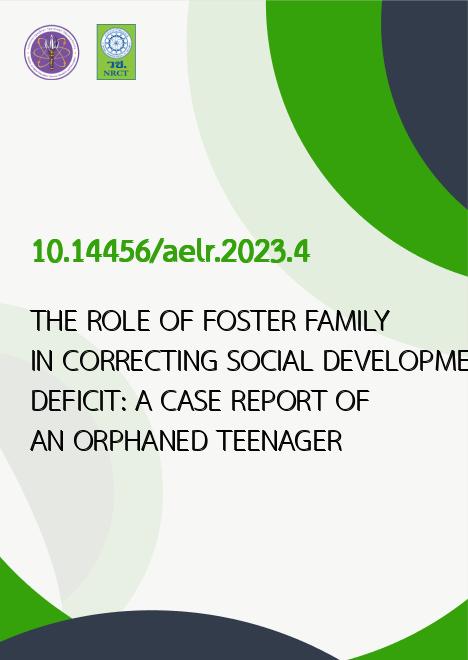
|
THE ROLE OF FOSTER FAMILY IN CORRECTING SOCIAL DEVELOPMENT DEFICIT: A CASE REPORT OF AN ORPHANED TEENAGER |
|---|---|
| รหัสดีโอไอ | |
| Creator | Chinun BOONROUNGRUT |
| Title | THE ROLE OF FOSTER FAMILY IN CORRECTING SOCIAL DEVELOPMENT DEFICIT: A CASE REPORT OF AN ORPHANED TEENAGER |
| Contributor | Sasipim TEERANAAMORNWONG, Wulan Patria SAROINSONG |
| Publisher | Asian Education and Learning Review |
| Publication Year | 2566 |
| Journal Title | Asian Education and Learning Review |
| Journal Vol. | 1 |
| Journal No. | 1 |
| Page no. | 35-43 |
| Keyword | Foster Family, Social Development Deficit, Orphaned Teenager, Case Study |
| URL Website | https://so07.tci-thaijo.org/index.php/AELR |
| Website title | https://so07.tci-thaijo.org/index.php/AELR/article/view/2609 |
| ISSN | 2985-2862 |
| Abstract | Parenting styles substantially affect children’s behavior. Uninvolved parenting style can extensively impact children’s development progress. This case study aims to investigate the role of a foster family in promoting social development and correcting the deficits of an adopted child from Uninvolved parenting care. The study used qualitative research methods. Four research tools were used, including a series of interviews and questionnaires for pre-adopted and after 4 years of adoption, both from the foster family and adopted child side. The sample group consists of 1 adopted child and 2 foster family members. The result shows that the foster family significantly improves the social development of the child raised neglected during their early childhood through their 4 training approaches. These approaches include strengthening relationships, encouraging empathy with others, promoting assertiveness and emphasizing respect for rules and social regulations. By strengthening the relationships, this 6-year-old child who showed no trust and isolated himself from unfamiliar persons can gradually build relationships with others and adapt to his peer groups. Learning empathy for others changes him from being a possessive child to being a shared with empathy child. The role of assertiveness training encourages him to speak out, be confident to express his feelings and even offer to help others. Teaching him to respect social rules and regulations made him aware of discipline and grow up happily as part of society. |
